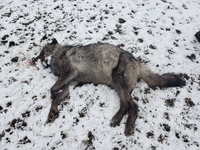Conservation and animal-protection groups announced a combined $22,500 reward this week for information leading to a conviction in the killing of a collared wolf outside the town of Cove in northeast Oregon.
On Feb. 15 Oregon State Police troopers, investigating a report from wildlife officials, found a collared wolf lying dead in a field. The troopers believe the black female wolf to be OR-109, who had been shot and killed that morning.
This killing follows 2021’s fatal poisoning of eight wolves in the same area of the state and another similar killing by firearm in January 2022, making this the 10th illegal killing over the past year alone. The combined reward offered by conservation groups for the killings totals at least $66,500.
“This onslaught of wolf killings in Oregon is deeply upsetting,” said Sophia Ressler, an Oregon-based staff attorney at the Center for Biological Diversity. “We need to find the poacher and hold them accountable for killing this precious wolf. We have a wolf-poaching crisis on our hands, and Oregon officials must take strong action.”
“Oregon’s wolf-poaching crisis is reaching a critical level,” said Kelly Peterson, Oregon state director at the Humane Society of the United States. “The death of OR-109 at the hands of a poacher is infuriating, especially given all of the other losses Oregon’s precious few wolves have suffered over the past two years. While this reward cannot bring her back, we hope it brings these cruel actors to justice and helps finally put an end to the illegal slaughter of our wolves.”
Anyone with information about any of these cases should contact the Oregon State Police TIP line at (800) 452-7888 or *OSP (677) or by e-mail at [email protected]. Callers may remain anonymous.
In Washington state, the Washington Department of Fish and Wildlife is inviting the public to submit written comment from Feb. 22 to April 11, 2022 on a proposed rule change and a new rule to address wolf-livestock conflict deterrence.
In September 2020, Gov. Jay Inslee directed WDFW to initiate rule making with the goal of instituting practices that would reduce the number of livestock killed or injured by wolves as well as the number of wolves lethally removed as a result of depredations of domestic animals.
The proposed rule change, if adopted, would amend the language of Washington Administrative Code (WAC) 220-440-080 to require that, to authorize lethal removal of wolves, the WDFW director (or WDFW staff designee) would need to confirm an owner of domestic animals has proactively implemented appropriate non-lethal conflict deterrence measures.
The proposal, if adopted, would also create a new rule (WAC 220-440-260) that directs WDFW staff, in consultation with willing, affected livestock producers, as well as affected federal, state, and tribal agencies, to author conflict mitigation plans that would establish area-specific criteria for the use of non-lethal and lethal measures to mitigate wolf-livestock conflict in areas of chronic conflict.
“If adopted, the proposed change to WAC 220-440-080 would align the code with the agency’s long-standing commitment to non-lethal conflict mitigation strategies,” said Wolf Policy Lead Julia Smith.
“The proposal creating WAC 220-440-260 aims to address areas that have experienced significant levels of livestock depredation and subsequent wolf removals year after year, an especially difficult scenario for all communities concerned about wolf conservation and management. This proposal focuses limited time and resources to areas where the most livestock and wolf loss has occurred in the state.”
In addition, a Draft Supplemental Environmental Impact Statement that analyzes the environmental impacts of four alternative rule making options and a Small Business Economic Impact Statement that evaluates the potential costs to businesses in the livestock industry resulting from the proposed rule and rule change were developed as part of the rule making process.
During this public comment period, WDFW is looking for input https://publicinput.com/U0420#0
on the draft proposed language for both WACs, as well as feedback on the DSEIS.
More information on wolves in Washington can be found at https://wdfw.wa.gov/species-habitats/at-risk/species-recovery/gray-wolf

